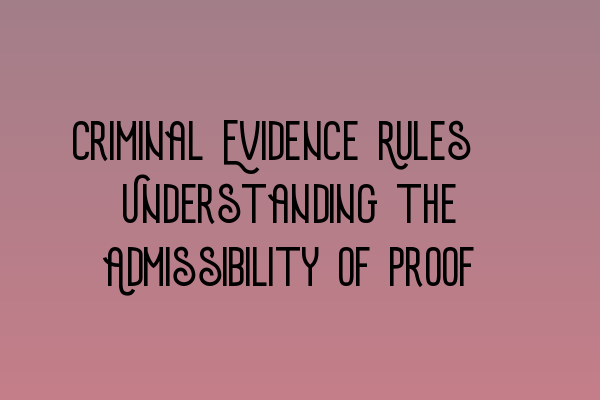Criminal Evidence Rules: Understanding the Admissibility of Proof
When it comes to criminal law, one of the key factors that determine the outcome of a case is the admissibility of evidence. The rules surrounding the admissibility of proof in criminal cases can be complex and nuanced, and it is crucial for criminal lawyers to have a solid understanding of these rules.
Why are Criminal Evidence Rules Important?
The admissibility of evidence is crucial in the criminal justice system because it ensures that only relevant and reliable evidence is presented before the court. Admissible evidence is information that is legally allowed to be considered by the court when reaching a decision.
Understanding these rules is not only essential for criminal lawyers but also for aspiring solicitors who are preparing for the Solicitors Qualifying Exam (SQE) in Criminal Law & Practice. If you’re planning to pursue a career as a criminal lawyer, it is vital to have a strong foundation in evidence law.
Types of Criminal Evidence
Before delving into the rules governing the admissibility of evidence, it’s important to understand the different types of evidence commonly used in criminal cases:
1. Direct Evidence
Direct evidence refers to evidence that directly proves a fact without the need for inference or interpretation. For example, eyewitness testimonies or video recordings are considered direct evidence.
2. Circumstantial Evidence
Circumstantial evidence relies on inference and suggests a fact rather than directly proving it. It involves connecting various pieces of evidence to reach a conclusion. For instance, if a suspect’s fingerprints are found at a crime scene, that can be considered circumstantial evidence.
3. Hearsay Evidence
Hearsay evidence is any statement made by someone who does not testify at the trial but is offered to prove the truth of the matter asserted. Generally, hearsay evidence is not admissible unless it falls within an exception. It’s important for criminal lawyers to be aware of the hearsay rule and its exceptions to effectively argue for or against the admissibility of such evidence.
4. Character Evidence
Character evidence relates to the personality, reputation, or character traits of the accused or the victim. It can be used to prove or challenge the credibility, honesty, or reputation of the parties involved. However, character evidence is subject to stringent admissibility rules.
Rules Governing Admissibility of Evidence
There are several rules in place to determine the admissibility of evidence in criminal cases. Here are a few key rules:
1. Relevance
Evidence must be relevant to the issues in the case to be admissible. It should have a logical connection to a fact in issue or assist in forming a reasonable inference. For example, if the defendant is charged with theft, evidence related to their financial situation or motive may be deemed relevant.
2. Hearsay
Hearsay evidence is generally inadmissible unless it falls within an exception. The exceptions to the hearsay rule include statements made under certain circumstances, such as excited utterances or business records.
3. Best Evidence Rule
The best evidence rule states that the original or best available evidence should be presented in court. Copies or secondary evidence may be admissible in specific circumstances, but the court generally prefers primary evidence.
4. Privileged Communication
Certain communications, such as those between an attorney and client or doctor and patient, are protected by privilege and cannot be used as evidence in court without the consent of the party who made the communication. It is crucial for criminal lawyers to be familiar with the various types of privileged communication.
Preparing for SQE and Criminal Law & Practice
If you’re preparing for the Solicitors Qualifying Exam (SQE) in Criminal Law & Practice, it’s crucial to have a comprehensive understanding of the rules governing the admissibility of evidence. SQE preparation courses can help you develop the necessary knowledge and skills to succeed in the exam. Make sure to check out the SQE 2 Preparation Courses and SQE 1 Preparation Courses offered by SQE Criminal Law & Practice Law UK.
In addition to preparing for the exam, it’s also beneficial to practice your understanding of criminal evidence rules. Enhance your knowledge with the SQE 1 Practice Exam Questions and SQE 1 Practice Mocks FLK1 FLK2 to test your knowledge and identify areas for improvement.
Conclusion
The admissibility of evidence is a critical aspect of criminal law. Aspiring criminal lawyers and those preparing for the SQE in Criminal Law & Practice should have a solid understanding of the rules governing the admissibility of proof. By familiarizing yourself with the different types of evidence and the rules surrounding their admissibility, you can effectively advocate for your clients and succeed in your legal career.
For more information on SQE Criminal Law & Practice Law UK, visit their website and stay updated with the latest SRA SQE Exam Dates.
